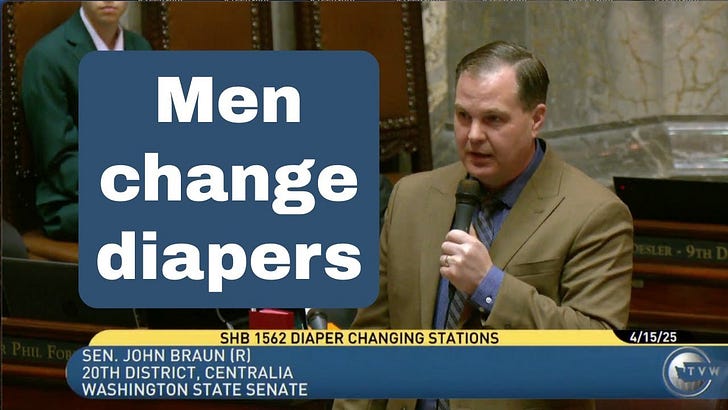Male Legislators Speak Up: 'I Changed a Lot of Diapers'
Plus: a public university in Denver offers the nation's only Minor in Men's Health thanks to Professor Steve Rissman, who studied here in Seattle.
Last year the Washington Fatherhood Council issued an excellent report on the status of fatherhood in this state. It highlighted many issues, including the biases, stigmas, stereotypes, and harmful narratives affecting some dads in Washington.
Recently the state Senate debated legislation intended to get baby diaper changing stations into more public restrooms — especially more men’s restrooms.
Speaking in support, Senator Liz Lovelett (D-Anacortes) said:
Some of the ways that we continue to experience gender discrimination are very subtle. For example, we only ever see baby diaper changing stations in women’s restrooms. We’ll have them in family restrooms, but certainly not in the men’s rooms…[With this bill] I am so excited that families across Washington state will be able to send dads out during dinner to go get those babies changed. [Watch the video for her complete comments.]
Later, three male senators — who among them have eleven kids — took to the microphone to support the bill, and also to correct the narrative. They said they changed their fair share of diapers, and many men’s bathrooms already have diaper changing tables.
“I wanted to speak up for fathers who, frankly, did change plenty of diapers,” said Senator John Braun (R-Centralia). "I don't know how often [Senator Lovelett] goes into men's restrooms, but I do quite a lot, and I routinely see diaper changing stations."
Senator Marcus Riccelli (D-Spokane), speaking to his diaper-changing prowess, said, “I was playing soccer right before my son was born and I broke my arm. I changed a lot of diapers with a cast.” Senator Paul Harris (R-Vancouver) added, “Because we were poor we had cloth diapers. I changed my fair share of diapers, and I know how to really change a diaper.”
View the comments by senators Liz Lovelett, Nikki Torres, John Braun, Paul Harris, and Marcus Riccelli.
Nelson Rascon, Executive Director of the Tacoma-based organization Dads MOVE, responded to the senators’ comments saying, “Some people may assume dads don’t do much to care for babies. Dads in Washington have been changing diapers in public restrooms for quite a while.”
Coming back to where I started, I’ll plug the Washington Fatherhood Council’s State of Fatherhood in Washington Study Report. In it the Council’s director, Anne Stone, says:
Behind any meaningful impact lies intentionality, focus, and hard work. This Study captures our partners’ work to lean into that intentionality and lift up fathers and families in Washington state to change the narrative that surrounds fathers. (emphasis added)
If you can pitch in financially to support WIBM’s advocacy, please become a paid subscriber for $6 a month or $70 for the year.
College Students in Colorado Can Get a Minor in Men’s Health
I was recently introduced to Professor Steve Rissman, who for decades has been living out his calling to support the health of boys and men. Steve is a naturopathic doctor who teaches at Metropolitan State University of Denver, but he graduated from Bastyr University here in Washington back in the ‘90s.
Steve set up the only Minor in Men’s Health offered at any university in the country. His university also offers a Men’s Heath Digital Badge, a ‘microcredential’ that shows evidence of competency in men's health to employers and grad schools.
Given the shorter lifespans and poor health outcomes many men experience, it is critical that our public health and health care workforces are empowered with the latest evidence-based information about men’s health issues.
Course Listing
Have a look at the interesting mix of courses Dr. Rissman chose to be core and elective for the Men’s Health Minor.
Description
“The Men’s Health Minor provides a comprehensive understanding of the health and wellness of men through evidence-based curriculum content. Students examine the diverse factors that contribute to the totality of men’s health and well-being, including discernment of existing paradigms that inform men’s health behaviors. Students receive a broad-based understanding of the key determinants of men’s health across culture, class, and race. Students learn the disease processes affecting men across the lifespan, the theories underlying masculinity and fathering practices, and the scientific research methods needed to evaluate the latest information in this expanding field of healthcare.”
See here for a more extensive write-up on the Men’s Health Minor, including a list of majors that complement the minor. Dr. Rissman can be reached at srissman@msudenver.edu.






